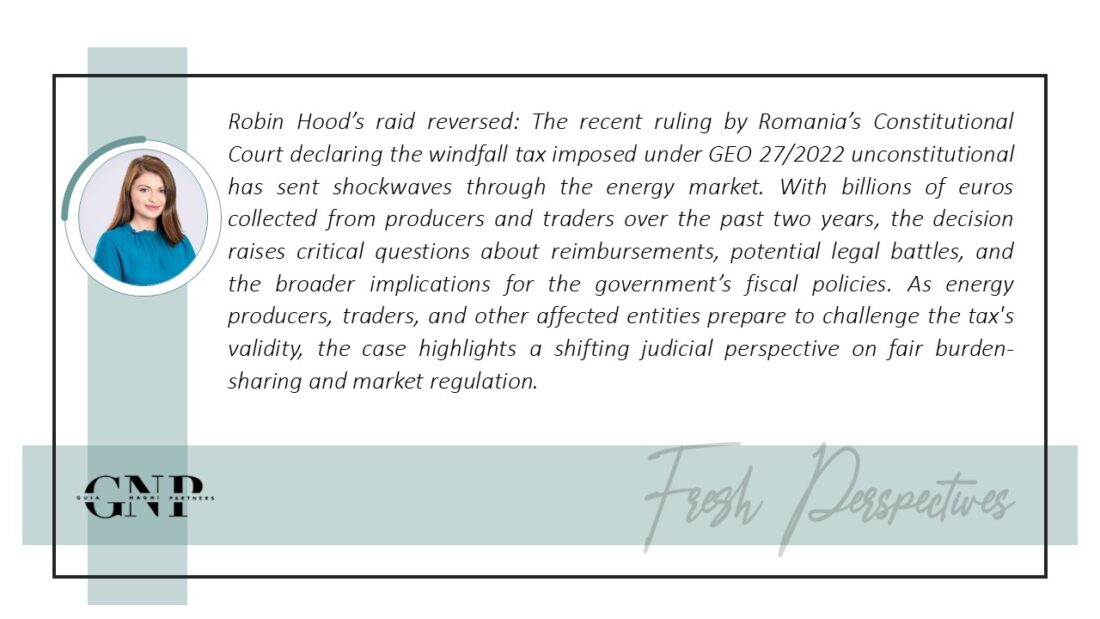Violeta Geru – Levelling the playing field: The Constitutional Court ruling that energized producers
No more overcharging electricity producers
In November, the Constitutional Court has declared the unconstitutionality of the overcharging of electricity producers under article 15 of GEO 27/2022, on the obligation to pay the contribution to the Energy Transition Fund by producers and Annex 6, regarding the calculation of the contribution to the Energy Transition Fund due by electricity producers for the production activity/aggregated entities (the “Windfall tax“).
The Constitutional Court press release highlights a significant shift in perspective, noting that the principle of fair burden-sharing and economic freedom was considered—an approach reminiscent of the Italian Constitutional Court’s 2015 decision addressing the over-taxation of oil companies, also known as the Robin Hood Tax[1]. However, the specific arguments that led the Court to declare the provisions of GEO 27/2022 unconstitutional remain to be seen. This ruling appears to mark a subtle departure from past rulings, such as when the Court upheld the constitutionality of taxing additional income derived from price deregulation in the natural gas sector.
This reasoning is still being formally drafted. Once finalized, it will be published in the Official Gazette of Romania, a necessary step for Constitutional Court rulings to become binding. From the date of publication, the ruling will apply moving forward and will render the challenged legal provisions unconstitutional. Notably, the law grants a 45-day period for the Parliament or Government to amend the unconstitutional provisions to align them with the Constitution. Until such changes are made—or if no action is taken within this timeframe—the provisions are suspended automatically and will cease to have legal effect after the 45-day window.
This ruling marks an important moment for energy producers and policymakers, as it underscores the need to balance taxation and regulation with constitutional rights and the broader goal of fostering a fair and competitive market.
How did the law evolve?
The legal provisions regarding the challenged Windfall tax have a complex history. Initially introduced through Article 15 of GEO 27/2022, enacted on March 22, 2022, the regulation aimed to impose an additional tax on electricity producers.
Subsequent amendments were made through GEO 119/2022, effective as of September 1, 2022. These changes significantly altered the scope and application of the Windfall tax. The key modification included requiring producers to pay to the state budget any revenue exceeding 450 lei/MWh from electricity sales.
The final form of the legislation was approved through Law 357/2022, effective as of December 15, 2022. This law ratified the amendments made by GEO 119/2022.
The plea of unconstitutionality specifically targeted the following provisions:
- Article 15 of GEO 27/2022 (as amended by GEO 119/2022, effective as of September 1, 2022). This includes references to Article I, item 13 of GEO 119/2022 and its associated Annex 2, equivalent to Annex 6 of GEO 27/2022.
- Article 1, point 21 of Law 357/2022, which introduced additional changes to Article 15 of GEO 27/2022.
What were the cases about?
The Constitutional Court upheld a plea of unconstitutionality raised in two separate cases. Both cases, initiated by renewable energy producers, revolved around challenges to GEO 27/2022 and its subsequent amendments through GEO 119/2022. Specifically, they dealt with recovery of damages by directly challenging the GEO 27/2022 (plaintiffs sought compensation for losses caused by the application of the emergency ordinance) or annulment of ANAF orders, arguing these orders were inconsistent with constitutional rights.
Arguments raised for supporting the unconstitutionality plea
Until a reasoned ruling will be published, we can speculate the reasoning of the Court from the arguments put forward in the referrals. The producers argued:
- Violation of Property Rights – The Windfall tax, computed as the entirety of revenues exceeding a fixed threshold, effectively amounts to a de facto expropriation. Producers argued that this measure deprived them of their lawful income, infringing their constitutional property rights.
- Infringement on Economic Freedom – Renewable energy producers highlighted disproportionate state interference in their business activities. The government’s measures failed to meet the proportionality principle, placing undue constraints on their ability to operate freely in the energy market.
- Discrimination Against Existing Production Capacities – The measure created unequal treatment, favouring new entrants and producers of thermal utilities using cogeneration while overburdening established electricity producers with excessive taxes.
- Violation of the Principle of Fair Tax Burden Sharing – plaintiffs argued that the Windfall tax was excessive, as it applied in addition to corporate income tax, creating an unfairly high tax burden for energy producers.
Why it matters
The unconstitutionality ruling highlights significant flaws in the regulatory framework for renewable energy producers. The broader implications of these rulings could pave the way for legislative amendments and changes to tax policy affecting energy markets across Romania.
The challenges brought before the CCR are part of a wider debate on the legality and fairness of the Windfall tax regime imposed under GEO 27/2022.
- Other challenges: Beyond these cases, pleas of unconstitutionality were also raised against GEO 27/2022 under different forms (the initial law and subsequent amendments, including the initial 80% windfall tax). There are currently at least 15 similar pleas registered before the Constitutional Court still awaiting a ruling and probably several others still not registered yet.
- ECJ referrals: Parallel proceedings at the European Court of Justice are requesting the court to examine the compatibility of the Windfall tax and similar measures with EU law, particularly regarding state aid, proportionality and non-discrimination.[2]
Conclusions
In terms of consequences, the media has reported that the state collected approximately EUR 5,43 billion from the windfall tax imposed by GEO 27/2022 over the past two years. This raises the potential issue of reimbursing the collected tax, along with interest[3]. The Ministry of Energy has stated, however, that the actual amount subject to reimbursement cannot be determined until a thorough inventory of the ongoing cases is completed, given that the Constitutional Court’s decision will enter into force only after its publication in the Official Gazette and will be binding only for the future.
So, who stands to benefit from the unconstitutionality of the Windfall tax?
First and foremost, the two companies that successfully raised the upheld pleas of unconstitutionality, as well as any other plaintiffs in court cases involving similar or identical pleas (even if not yet settled by the Constitutional Court or yet referred by common courts), could benefit from the ruling.
With the amendments introduced by GEO 119/2022 in September 2022, the scope of entities subject to the windfall tax was expanded beyond producers. The law now includes: (i) aggregated electricity production entities, (ii) traders, (iii) suppliers involved in trading activities, (iv) aggregators active on wholesale electricity and gas markets, (v) partners in hedging contracts for electricity producers. The detailed methodology for their obligation was included in Annex 6.1 of the revised GEO 27/2022.
Although the ruling seems to explicitly address energy producers it can be argued that the unconstitutionality of Article 15 extends to traders, wholesale market suppliers, and others. As such, non-producers may also benefit from the CCR ruling if they have pending cases involving Article 15 and Annex 6.1. To mitigate any risk of divergent interpretations by the courts, submitting a self-standing plea for clarity and procedural security can be considered (preferably before the publication of the Constitutional Court ruling).
Additionally, the potential impact of referrals to the ECJ cannot be overlooked.
The lingering question is whether the Ministry of Energy will attempt to counteract the Constitutional Court ruling. While such rulings are not subject to appeal, we cannot exclude the possibility of a strategy involving a referral to the ECJ. The government might seek to justify the Windfall tax under EU principles, arguing consumer rights, the intended purpose of the funds, market stability, or alignment with the climate-neutral economy objectives, thus triggering a conflict between the Constitutional practice and EU Law.
In conclusion, these developments demand close attention from all stakeholders in the energy market, as well as from the government. Strategic preparation for further legal and regulatory steps will be crucial in safeguarding their respective interests. We will certainly keep an eye and analyse these changes every step of the way.
[1] https://www.cortecostituzionale.it/documenti/download/doc/recent_judgments/S10_2015_en.pdf
[2] Request for a preliminary ruling from Curtea de Apel București (Romania) lodged on 5 June 2024 – PPC Renewables Romania SRL v Agenția Națională de Administrare Fiscală, Direcția Generală de Administrare a Marilor Contribuabili, Guvernul României, Ministerul Finanțelor, (Case C-392/24, PPC Renewables Romania)
Request for a preliminary ruling from the Curtea de Apel București (Romania) lodged on 27 June 2023 — Brăila Winds SRL v Direcția Generală Regională a Finanțelor Publice București — Administrația Fiscală pentru Contribuabili Mijlocii București, Ministerul Finanțelor, Președintele Agenției Naționale de Administrare Fiscală, Agenția Națională de Administrare Fiscală (Case C-391/23, Braila Winds)
[3] https://www.energynomics.ro/en/me-the-amount-that-the-state-should-reimburse-from-the-energy-transition-fund-cannot-be-estimated-at-the-moment/





No Comments